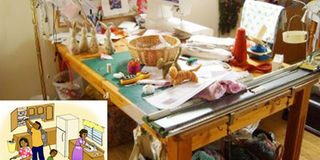A lazy man’s guide to being neat and organised

A strict cleanliness routine or a helping hand to keep things tidy may be all you need to save your image, writes Agnes K. Namaganda.
You’ve probably been to a home where newspapers are scattered about, with toilet rolls on the fridge and others on the dining table even when there’s enough space in the bathroom. You’ll find that even the chairs are quite out of line.
Being busy is often the excuse but how these people manage to get the time to disorganise is amazing. Usually, plain laziness is the main reason for having an untidy home or office, though psychologists claim that the melancholy and phlegmatic temperaments are neater and tidier than sanguines and cholerics.
Apart from affecting how other people view you, disorganisation and untidiness can cost you a lot of time and money because you’ll misplace receipts and spend lots of time shuffling through drawers looking for them - one may forfeit the money spent on an item because they probably have no proof that they even spent the money.
A working mother with two young children may be too busy to keep everything running smoothly and may need a house help, advises Jemma Kasaali, an interior designer and mother. She also thinks that tablecloths are accessories that easily give a room a messy look. Some may argue that they are so yester-year but if they work for you, always make sure they are properly straightened all the time.
Impulsive buyers will most probably purchase what they don’t need, thus suffer with a lot of junk around their homes and offices. If you’re this kind of person, think carefully about buying any purchase that is not on your shopping list.
“Allocate particular places for all items around the house because this will go a long way in ensuring you stay organised,” Ms Kasaali advises. This may mean investing in shelves, binders for your paper work and sets of drawers to this effect. It may be quite expensive but may mean the difference between saving time looking for that receipt or paying for an item afresh. It will also help you to quickly throw together an outfit with matching shoes and handbag - if they are in one place.
Nothing is probably responsible for untidiness like clutter. People who accumulate clutter view it as antiques, as things they have built an attachment to over the years. To qualify as clutter, keep the items boxed up somewhere, like in the garage and see if you’ll need or think about them in the next six months and if you don’t, just give it all away.
Also, instead of having bursting suitcases, an overflowing wardrobe and several other drawers full of clothes such that you have to search everywhere before you come up with a dress, give away everything you haven’t worn in a year.
If your house is totally out of order right now, make a cleaning timetable. It does not have to be several hours each weekend as this can seem energy-draining before you even start, but make it 30 minutes each day before bedtime. Start with the book shelf. Dust it and arrange the books neatly. Scrub your bathtub the next day. Remove cobwebs the next and save large tasks like cleaning out your wardrobe or the carpet for the weekends. Experts say that a habit is developed within 21 days; you’ll be surprised at how you’ll feel inclined or even look forward to chores which tired you just by thinking about them.
You’re probably feeling satisfied with waking up or returning after a day’s hard work to a clean organised house. Not so fast though, because it’s easy to fall back into the untidy pattern even after the magical 21 days. To ensure this doesn’t happen, clean immediately each time you have to, without procrastinating. Do the dishes after supper because you’ll probably be in a hurry to get to work in the morning and the grease the saucepans and plates may need a little soaking or warm water to loosen off, which time you may not have or may have to waste.




